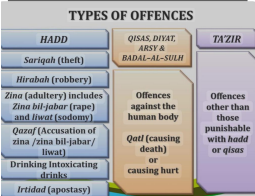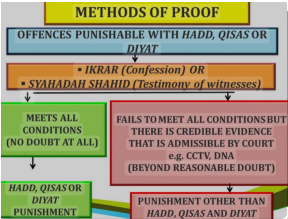
Course Overview
Islamic Criminal Law )الجنائي الفقه) is an essential branch of Islamic jurisprudence that deals with crimes and punishments. This online course provides a comprehensive study of Islamic criminal law, exploring the foundations and principles behind punishments in Islamic teachings. It aims to equip students with a deep understanding of the types of crimes )الجنايات) as defined in Sharia law, their legal consequences, and the judicial processes associated with them. The course will explore key criminal offenses such as Hudud )حدود( , Qisas ) (قصاص) and Ta'zir ,)تعزير ) along with the methodologies to adjudicate such matters in an Islamic legal framework.
Course Objectives
- Understand the foundations of Islamic criminal jurisprudence )الجنائي الفقه أصول ) and its significance in Islamic society.
- Differentiate between major categories of crime under Islamic law, including Hudud (حدود)Qisas (قصاص) ,and Ta'zir .) تعزير (.
- Analyze the legal processes involved in criminal adjudication as outlined in Islamic law
- Evaluate the application of Islamic criminal punishments in historical and modern contexts.
- Comprehend the principles of justice( العدالة(and fairness as they pertain to Islamic criminal law.

Introduction to Islamic Criminal Lawr
- Definition and Scope of Fiqh Al-Jinai )الجنائي الفقه)
- Understanding the framework and sources of Islamic criminal law.
- Sources of Law(الفقه مصادر) Qur’an, Sunnah, Ijma’ ,)اجماع) and Qiyas )قياس) as foundations of legal rulings.
- Classification of Crimes in Islamic Law: Differentiating between Hudud, Qisas, and Ta’zir crimes.
- Hudud Crimes and Punishments )الحدود جرائم )
- Definition of Hudud:)حدود( Crimes with fixed punishments as prescribed in the Qur’an and Sunnah.
- Types of Hudud Offenses:
- (السرقة(Theft
- Adultery (الزنا(
- Apostasy (الردة(
- Drinking Alcohol (شرب الخمر(
- Legal Requirements for Proving Hudud Crimes: Burden of proof and the role of witnesses.
Fixed Punishments:
( الثابتة العقوبات )Understanding the nature of fixed punishments under Islamic law. Qisas Crimes and Punishments (القصاص) Concept of Qisas :)قصاص)
- The principle of "an eye for an eye."
- Types of Qisas Crimes:

Conditions for Implementing Qisas:
- Requirements for retribution and compensation )دية)
Alternatives to Qisas:
- Exploring forgiveness )العفو) and financial compensation.
- Ta'zir Crimes and Punishments)التعزير)
- Understanding Ta’zir :)التعزير)
- Crimes that do not fall under Hudud or Qisas but are still subject to punishment.
- Discretionary Punishments:Role of judges in determining penalties.
- Examples of Ta'zir Crimes:Offenses like slander ,)القذف) bribery ,)الرشوة) and minor theft .
- Principles of Flexibility in Ta'zir:Balancing justice and mercy.
- Judicial Processes in Islamic Criminal Law The Role of the Judge: )القاضي ) Powers and responsibilities in criminal cases.
- Evidentiary Standards in Islamic Law: Types of evidence, burden of proof, and the role of testimony.
- Punishment Execution and Repentance:The possibility of repentance )التوبة) and its impact on criminal sentencing.
- Contemporary Issues in Islamic Criminal Law
Application of Fiqh Al-Jinai in Modern Times:
- Discussion of Islamic criminal law in modern legal systems.
Challenges and Reforms:
- Addressing misconceptions and the role of Islamic criminal law in contemporary society
Course Outcomes:
By the end of the course, students will:
- Gain a deep understanding of Islamic criminal law and its major categories (Hudud, Qisas, and Ta’zir).
- Be able to analyze and critique the process of criminal adjudication in Islamic law.
- Demonstrate a nuanced comprehension of the punishments for various crimes under Sharia law.
- Understand the ethical and moral foundations of Islamic criminal jurisprudence and its emphasis on justice and fairness.
- Apply the principles learned to discuss contemporary issues related to the implementation of Islamic criminal law.


